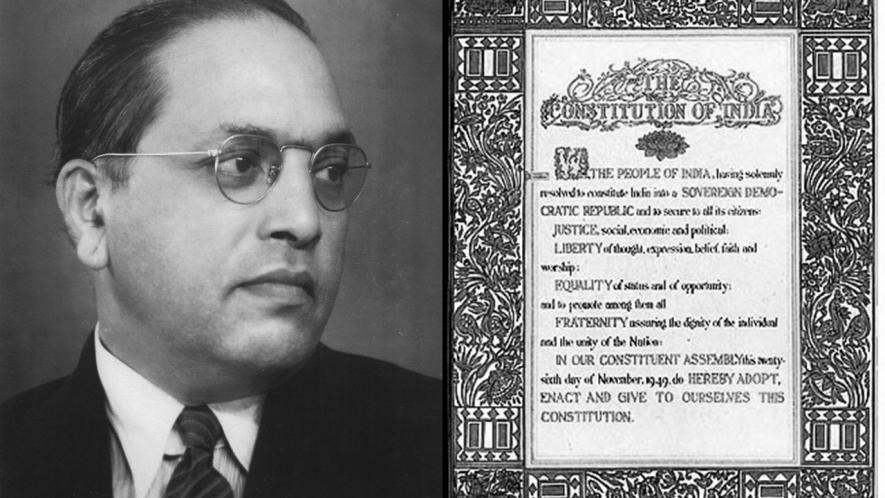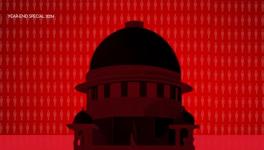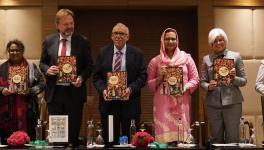75th Anniversary of Constitution and Ambedkar’s Warning

While celebrating the 75th anniversary of the adoption and enactment of the Constitution of India on November 26, it is of seminal significance to be mindful of the concerns expressed by B R Ambedkar to make the Constitution more intensely relevant for Indian society marked by persistent social and economic inequalities. He, in tune with the legislative intent of the Constituent Assembly, was a powerful protagonist of a secular India, primarily to avert what he called the Hindu Raj which he said would be a calamity for the country.
Ambedkar’s Warning on War on Muslims
It is rather atrocious that Bharatiya Janata Party (BJP) leaders, including Prime Minister Narendra Modi, wielding power and governing the country by securing the mandate of the people, are spreading hatred in the name of religion and unleashing anger and acrimony against the minorities, especially Muslims.
Had Ambedkar been alive, he would have been aghast to see the ill- treatment meted out to Muslims, especially in the BJP-ruled states, as well as the incendiary speeches delivered by Hindutva leaders, calling for committing genocide against them and robbing their social and economic entitlements. All such tragic happenings are occurring without a murmur of protest from high constitutional functionaries hailing from BJP.
Such incidents taking place when the 75th anniversary of the Constitution is being celebrated, are a grim reminder of Ambedkar’s warning in the Constituent Assembly on December 17, 1946, that the way some people talked about Hindu-Muslim issues with bitterness and rancour that time, gave an impression that they were waging a war against Muslims.
Ambedkar had sternly cautioned that “…if there is anybody who has in his mind the project of solving the Hindu-Muslim problem by force, which is another name of solving it by war… in order that the Muslims may be subjugated”, he feared “[t]his country would be involved in perpetually conquering, them”. He, therefore, urged people in power to exercise it with wisdom. Those words resonate in India today, which is in the grip of polarisation in the name of religion.
Attack on the Sambhal Mosque
On the eve of the 75th anniversary of the Constitution, toxicity was spewed in Uttar Pradesh’s Sambhal to provoke Muslims who protested against slogans of ‘Jai Shri Ram’ in front of the Jama Masjid that was being surveyed on the orders of the court. It was a mosque built several centuries back and its status as an Islamic shrine is protected by the Places of Worship (Special Provisions) Act, 1991. The Act prohibits conversion of any place of worship and provides for the maintenance of the religious character of any place of worship as it existed on the 15th day of August, 1947. Five of the protesting Muslims lost their lives allegedly by police firing.
SC Ruling Against Bulldozer Justice
In most BJP-ruled states, demolition of houses of persons, specifically of Muslims, accused of some offences has shaken judicial conscience so much that the Supreme Court, in its judgement on November 10, 2024, a good 16 days before the 75th anniversary of the Constitution, described the so-called ‘bulldozer justice’ rendered by demolishing the houses of the accused as unknown to the civilised societies and held it to be “lawless, ruthless state of affairs.”
The top court noted that the “bulldozer demolitions carried out by state authorities subverted the authority of courts as it essentially took up an adjudicatory role to determine the guilt of an accused person and punish them…In that way, it denigrated the separation of powers”.
Justice B R Gavai of the apex court, who was part of the bench which delivered the judgement, noted that “bulldozer demolitions violated natural justice, the citizen’s right to shelter and inflicted collective punishment on the family of the accused”.
Such bulldozing of houses of persons merely accused of offences meant bulldozing the Constitution, which is the repository of the rights and liberties of people.
Institutional Collapse of ECI
Time and again, questions are being raised about the impartiality and neutrality of the Election Commission of India (ECI) while conducting elections. Recall that Chief Election Commissioner (CEC) Rajiv Kumar, accused of following in the footsteps of the Modi regime, supported the anonymity of donors paying huge amounts under the Electoral Bond Scheme (EBS) to political parties in violation of the Supreme Court judgement that declared the EBS as unconstitutional.
Read Also: People Making ‘Save Constitution’ an Electoral Issue Bodes Well for Country
Such a conduct by the CEC has created an impression that he is kowtowing to the executive in violation of the constitutionally prescribed independence it is mandated to uphold. The way CEC Kumar is behaving proves the apprehensions of Ambedkar, expressed in the Constituent Assembly on June 16, 1949, that in the absence of any provision in the Constitution to prevent the appointing of either a fool or a knave as Election Commissioner, it would be likely that the ECI would come under the thumb of the executive.
Tragically, the CEC and the other two Election Commissioners have come under the thumb of the executive. Such institutional collapse represented by ECI’s compromised functioning has endangered the Constitution beyond measure. This was also manifested in the observations of the Supreme Court in November 2022, when its five-judge Bench, headed by Justice K.M. Joseph, while hearing pleas challenging the constitutionality of the present appointment process of the CEC and other election commissioners, contended that the appointments were being done as per the whims of the executive.
The bench had then said: "The country needs election commissioners who would not shirk from even taking on the Prime Minister if required, and not just weak-kneed yes-men."
Constitutional Morality
It is sad that on the occasion of the 75th anniversary of the Constitution, the country’s ECI is far from the vision articulated by the apex court. It has shown no guts in holding Prime Minister Modi accountable for his recurrent Islamophobic speeches while appealing to people to vote for his party, BJP. This certainly does not augur well for the future of our democracy and Constitution.
Read Also: Over 17,400 Citizens Write to EC, Seek Action Against PM Modi for Hate Speech
Ambedkar in his last speech in the Constituent Assembly on November 25, 1949, had underlined the necessity of comprehensive cultivation of constitutional morality at every level for the successful working of the Constitution.
Safeguarding the independence of the institutions set up by the Constitution is part of the long-drawn process of continuously cultivating constitutional morality. That the people, during the conduct of the 18th general elections, came forward to save the Constitution from the onslaught of the Modi regime, raises hope that they will further save it and defend it from the powers that be, who are bent upon tearing it apart.
S N Sahu served as Officer on Special Duty to President of India K R Narayanan. The views are personal.
Get the latest reports & analysis with people's perspective on Protests, movements & deep analytical videos, discussions of the current affairs in your Telegram app. Subscribe to NewsClick's Telegram channel & get Real-Time updates on stories, as they get published on our website.
























